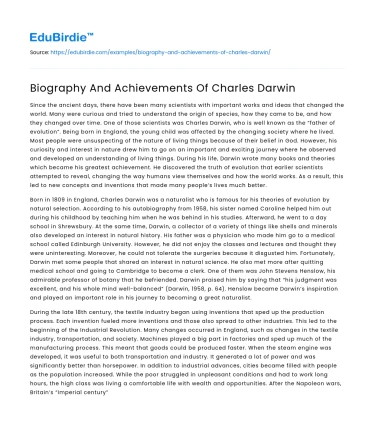Since the ancient days, there have been many scientists with important works and ideas that changed the world. Many were curious and tried to understand the origin of species, how they came to be, and how they changed over time. One of those scientists was Charles Darwin, who is well known as the “father of evolution”. Being born in England, the young child was affected by the changing society where he lived. Most people were unsuspecting of the nature of living things because of their belief in God. However, his curiosity and interest in nature drew him to go on an important and exciting journey where he observed and developed an understanding of living things. During his life, Darwin wrote many books and theories which became his greatest achievement. He discovered the truth of evolution that earlier scientists attempted to reveal, changing the way humans view themselves and how the world works. As a result, this led to new concepts and inventions that made many people’s lives much better.
Born in 1809 in England, Charles Darwin was a naturalist who is famous for his theories of evolution by natural selection. According to his autobiography from 1958, his sister named Caroline helped him out during his childhood by teaching him when he was behind in his studies. Afterward, he went to a day school in Shrewsbury. At the same time, Darwin, a collector of a variety of things like shells and minerals also developed an interest in natural history. His father was a physician who made him go to a medical school called Edinburgh University. However, he did not enjoy the classes and lectures and thought they were uninteresting. Moreover, he could not tolerate the surgeries because it disgusted him. Fortunately, Darwin met some people that shared an interest in natural science. He also met more after quitting medical school and going to Cambridge to become a clerk. One of them was John Stevens Henslow, his admirable professor of botany that he befriended. Darwin praised him by saying that “his judgment was excellent, and his whole mind well-balanced” (Darwin, 1958, p. 64). Henslow became Darwin’s inspiration and played an important role in his journey to becoming a great naturalist.
Save your time!
We can take care of your essay
- Proper editing and formatting
- Free revision, title page, and bibliography
- Flexible prices and money-back guarantee
During the late 18th century, the textile industry began using inventions that sped up the production process. Each invention fueled more inventions and those also spread to other industries. This led to the beginning of the Industrial Revolution. Many changes occurred in England, such as changes in the textile industry, transportation, and society. Machines played a big part in factories and sped up much of the manufacturing process. This meant that goods could be produced faster. When the steam engine was developed, it was useful to both transportation and industry. It generated a lot of power and was significantly better than horsepower. In addition to industrial advances, cities became filled with people as the population increased. While the poor struggled in unpleasant conditions and had to work long hours, the high class was living a comfortable life with wealth and opportunities. After the Napoleon wars, Britain’s “Imperial century” followed. It became powerful at sea with its Royal navy and colonies in places such as Australia and India.
In 1837, Queen Victoria’s reign began, marking the start of the Victorian Era in England. Liberalism and individualism became a part of society as a result of the Industrial Revolution. People competed to grow their businesses while the poor became even worse off. At the same time, the realm of science also began changing. Before, the majority of the people believed in the idea of the fixity of species where God created all things to be perfect and therefore had no need to change. Even scientists based their thinking and explanations of life on that idea. However, a few scientists discovered evidence such as fossil remains that did not fit in with this belief. The public slowly became exposed to the unfamiliar idea of evolution. Sometime after, as Darwin had figured out his own explanation about evolution by natural selection, Mendel also proposed an idea about inheritance .
In the late 19th century to the early 20th century, many theories appeared that countered the idea that natural selection was the reason living things evolved. Even though the evolutionary thought became known to scientists, they could not agree if natural selection was the cause or not. This marked the “eclipse of Darwinism” where Lamarckism, Mendelism, and other theories became the new focus. However, as time passed, scientists came to accept both Darwinism and Mendelism in a synthesis called the modern synthesis.






 Stuck on your essay?
Stuck on your essay?

